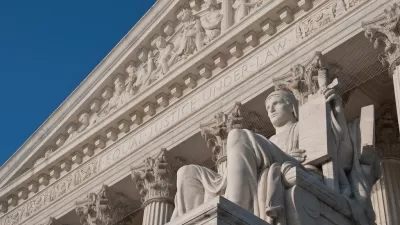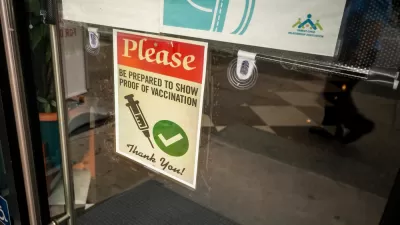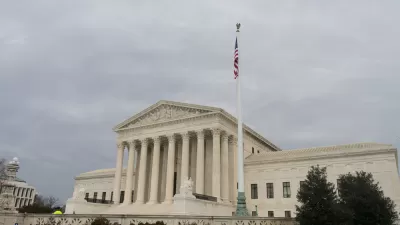Health care workers in New York will be required to be vaccinated against COVID-19 after the Supreme Court voted 6-3 to reject hearing an appeal brought by workers who had sought a religious exemption. Also, an update on the federal vaccine mandate.

When it comes to vaccine mandates issued by governments, a key issue is to look at the level of government. Mandates issued by states and lower levels of government are faring far better than those by the federal government.
"The Supreme Court on Monday refused to block New York’s requirement that health care workers be vaccinated against the coronavirus even when they cite religious objections," reported Adam Liptak, who covers the United States Supreme Court for The New York Times, on Dec. 13.
As is often the court’s practice in rulings on emergency applications, its unsigned order [pdf] included no reasoning. But Justice Neil M. Gorsuch filed a 14-page dissent saying that the majority had betrayed the court’s commitment to religious liberty.
In fact, all but three sentences in those 14 pages are written by Gorsuch. More on his dissent below, followed by a ruling by the U.S. 5th Circuit Court of Appeals in New Orleans on Dec. 15 on one of two preliminary injunctions applied by federal district courts on the Biden administration's health care worker COVID-19 vaccine mandate.
The vote was 6-3, reports Nina Totenberg, legal affairs correspondent for NPR, in a briefer article on the ruling that includes a two-minute audio version.
The six-justice majority included the court's three liberals and three of its conservative justices, too — Justices Brett Kavanaugh, Amy Coney Barrett and Chief Justice John Roberts.
The ruling is similar to one in October where the court "refused to provide relief to health care workers in Maine who had made an essentially identical request in a challenge to a similar state requirement, over the dissents of the same three justices," adds Liptak. Justice Samuel A. Alito Jr. joined in Gorsuch's dissent on Dec. 13 and Justice Clarence Thomas "also said he would have blocked the vaccine requirement, but he gave no reasons."
The court has also rejected challenges to vaccination requirements at Indiana University [see related post below], for personnel in New York City’s school system and for workers at a Massachusetts hospital. The court also rejected a challenge to a federal mandate requiring masks for air travel.
Those rulings were all issued by only one justice, which can be a sign that the legal questions involved were not considered substantial. But those rulings did not involve religion.
Role of religion
"The ruling from the Supreme Court came in a pair of challenges brought by doctors, nurses and other health care workers who said the requirement violated their right to the free exercise of religion," adds Liptak.
A federal judge in Brooklyn ruled against the challengers in the case before him, but another federal judge, in Utica, N.Y., ruled for the challengers in a second case.
In a consolidated appeal in the two cases, the United States Court of Appeals for the Second Circuit, in New York, refused to block the requirement [pdf].
In his dissent [pdf], Justice Gorsuch wrote:
These applicants are not ‘anti-vaxxers’ who object to all vaccines. Instead, the applicants explain, they cannot receive a COVID–19 vaccine because their religion teaches them to oppose abortion in any form, and because each of the currently available vaccines has depended upon abortion-derived fetal cell lines in its production or testing.
"In its brief, the state...agreed that where possible, federal law requires employers to provide reasonable accommodations for religious objectors, but it noted that does not require employers to offer objectors their preferred accommodation — namely a blanket religious exemption allow," added Totenberg of NPR.
Health care worker shortage
"New York State estimates that about 4 percent of its health care work force — or 37,000 workers — have left their jobs as a result of the vaccine mandate, which was issued by Gov. Kathy C. Hochul on Aug. 26 and went into effect about a month later," adds Liptak. Hochul, who had served seven years as lieutenant governor under Gov. Andrew Cuomo, took office on Aug. 24 after Cuomo resigned.
Because of the pending court cases, workers who had requested religious exemptions were permitted to work until Nov. 22, but then had to get vaccinated, go on leave or resign.
Ms. Hochul has since declared a state of emergency in light of a serious shortage of medical workers in upstate New York exacerbated by these job losses.
Federal health care worker vaccine mandate
The ruling by the Fifth Circuit Court of Appeals was mixed. Technically a loss, there was good news in the ruling for the Biden administration, reports Kelly Gooch for Becker's Hospital Review on Dec. 16.
The 5th Circuit Court of Appeals in New Orleans on Dec. 15 denied the Biden administration's request to lift a district court's injunction that blocked the mandate in 14 states that had challenged the mandate, but granted a stay on the injunction's application to any other jurisdiction.
As posted earlier, Federal district court Judge Terry A. Doughty on Nov. 30 had gone beyond the 14 states that filed the lawsuit against the Centers for Medicare and Medicaid (CMS), part of the Department of Health and Human Services (HHS), who had issued the rule and applied the ruling nationwide.
A day before Doughty issued his ruling from Louisiana, U.S. District Judge Matthew Schelp in St. Louis had blocked the same CMS rule in 10 states.
"The 8th Circuit Court of Appeals in St. Louis upheld the Missouri court's order on Dec. 13," adds Gooch. [See "vaccination scorecard" at base of "Biden's 'Path Out of the Pandemic' Imperiled by Multiple Court Decisions," posted Dec. 5.]
The result of the 5th Circuit's ruling [pdf] is that the CMS vaccination mandate "has effectively [been] revived in 26 states...for eligible staff at healthcare facilities participating in Medicare and Medicaid programs."
Related in Planetizen:
- Another Biden COVID Vaccine Mandate on Hold [affecting health care workers], December 1, 2021
- Supreme Court Allows Indiana University's Vaccine Mandate to Remain in Place, August 16, 2021
- SCOTUS: Freedom of Religion Trumps Public Health in a Pandemic, November 29, 2020
- U.S. Supreme Court Rules on State-Imposed Social Distancing Restrictions [in religious services], June 1, 2020
FULL STORY: Supreme Court Allows Vaccine Mandate for New York Health Care Workers

Trump Administration Could Effectively End Housing Voucher Program
Federal officials are eyeing major cuts to the Section 8 program that helps millions of low-income households pay rent.

Planetizen Federal Action Tracker
A weekly monitor of how Trump’s orders and actions are impacting planners and planning in America.

Ken Jennings Launches Transit Web Series
The Jeopardy champ wants you to ride public transit.

Opinion: Transit Agencies Must View Service Cuts as Last Resort
Reducing service could cripple transit systems by pushing more riders to consider car ownership, making future recovery even less certain.

‘Smart Surfaces’ Policy Guide Offers Advice for Building and Maintaining Urban Tree Canopies
Healthy, robust tree canopies can reduce the impacts of extreme heat and improve air quality.

New Jersey Lawsuit Targets Rent-Setting Algorithms
The state of New Jersey is taking legal action against landlords and companies that engage in what the state’s Attorney General alleges is illegal rent fixing.
Urban Design for Planners 1: Software Tools
This six-course series explores essential urban design concepts using open source software and equips planners with the tools they need to participate fully in the urban design process.
Planning for Universal Design
Learn the tools for implementing Universal Design in planning regulations.
Heyer Gruel & Associates PA
Ada County Highway District
Institute for Housing and Urban Development Studies (IHS)
City of Grandview
Harvard GSD Executive Education
Toledo-Lucas County Plan Commissions
Salt Lake City
NYU Wagner Graduate School of Public Service




























